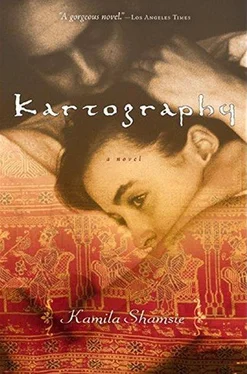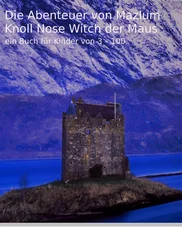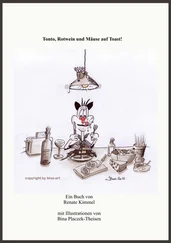I leaned back against the wall of my dorm room, and opened my desk drawer to look at the photograph of the four of us — Sonia, Zia, Karim and me — which lay, unframed, on top of a clutter of staples, paperclips, sticky tape, pens and drawing pins. My father had taken this picture the day before Karim left for London, and it had stayed hidden yet within reach through all my years at college in upstate New York.
‘Eratosthenes,’ I said. That was the name with which I’d left off the last conversation I’d had in my head with him.
‘What? Can’t hear…sorry, it’s Karim. I’m sorry, of course you don’t recognize my voice, it’s…’
‘Broken,’ I said. Why did he sound so formal? ‘But instantly recognizable all the same.’
‘And yours too.’
‘My voice has not broken, thank you.’ I’d intended flippancy, but I think I sounded annoyed.
‘It’s gone husky.’
‘Not really. I’ve got a bit of a sore throat.’
‘Sick as a dog?’ he said.
‘No, just a minor annoyance.’
‘No, it was a joke. Your voice is husky. Huskie, like the dog. So you’re sick as a—’
‘Oh. Yeah. Got it.’ I attempted a laugh but it came out wrong. The first rule of humour that Karim and I had always subscribed to: if the other person doesn’t get the joke, just move on. I looked out of the window at my hallmates slinging snowballs at one another, the freshly fallen snow tinged blue in the moonlight. One of them, Tamara perhaps, looked up and saw me, threw a snowball at my window in an invitation to join the fun, and for a moment I wanted to end the phone call and run downstairs.
‘I said Eratosthenes. Just now.’
‘Can’t hear properly. I’m at the airport and there are all these announcements and…oh hell, scary demon-baby has just started bawling. I’ll find a quieter phone and call you back. Don’t go away.’
I replaced the receiver on the phone base, and looked out of the window again. Two of my friends were lying next to each other in the snow, their arms fanning out away from their bodies, pushing aside the powdery snow. Watching them, I found I was raising my own arms, feeling remembered water currents tugging against my fingertips as I floated in Karachi’s sea. I lowered my arms. What was I doing here? The two figures outside stood up and stepped out of their outlines, leaving behind a pair of snow angels, the wing of one overlapping with the wing of the other. Siamese twin angels.
I ran my fingers through my hair. Why had I sent him that essay? Of course he had called after receiving it. I sat down, cross-legged, beside my desk, and from the bottom drawer I pulled out four pieces of writing paper, neatly taped together, which constituted Karim’s last communication with me, back in 1990. On one side was a map of Karachi. A useless, partial map of Karachi, which I had brought with me to America to see if it would bring me any kind of comfort, any kind of pain, on the days when I was most homesick. The answer to that question I quickly found was no, and no again. I laid the paper on the ground, map side up, smoothing it flat with the palm of my hand, reminding myself I needed to hoover — sorry, vacuum — my room. Streets leading to other streets, streets named, areas defined, places of interest clearly marked out. This map was Karachi’s opposite. It could only exist through its disdain for the reality of the city: the jumble, the illogic, the self-definition, the quicksilver of the place. As usual, the map did nothing but irritate me. I turned the taped sheet over, and flicked away the crumbs of chocolate-chip cookies that had been squashed between paper and carpet. I really needed to hoover.
Myriad pieces of paper taped together. What had hurt me most was that they were originals. If he’d wanted to make a point surely he could just have made photocopies of my letters and taken his scissors to them. But to cut up the originals…to have such certainty that nothing on those pages would ever make him want to take another look, make another assessment…to have such certainty, and not to hide it. He was never so cruel when I knew him.
He was certainly never so cruel that he unveiled my own cruelty to me, offered it up free of contrasts to make it appear all the harsher. I had written him letters full of laughter, letters in which I expressed how much I missed him. These fragments, which he pasted together, were only extracts, contextless; they did not — oh God, surely they did not — reflect anything but a partial truth of who I was, of who I had become in those defining years when he was in so many ways absent to me.






. . .
I had never posted a response to that letter collage. Oh, it would have been easy to chop up his letters, paste together everything that had annoyed me in them, every question (and there were many) about maps and street names, which he knew I had no interest in, and which seemed to serve only as a reminder of the distance between us. I, too, could paste one side of a sheet with everything he’d said to irritate me. But, and here’s the point I had never understood, Karim and I wrote so often, so copiously, to each other that one side of a sheet was nothing, just a tiny fraction of the whole, hardly indicative of anything at all. Yes, my final letter to him had been an explosion of irritation, but Karim should have known my flare-ups seldom lasted long. The Karim I thought I knew would have written back, his tone half-amused, half-sardonic, and said:
Finally — you’ve let it all out. I could explain to you that you’re not supposed to read letters intended for other people, stupid! but we’ll let your lack of etiquette pass this once. I’ve read between the lines of your letter, and I guess you really miss me, huh? Ra, that’s a two-way street. Oops, I mentioned streets. Can you ever forgive me? All right, seriously though, since you’ve finally stopped making snippy little comments and seem willing to address the matter head-on, here’s why I am the way I am about Karachi and maps and all that stuff…
That’s the sort of letter I’d get from the Karim I thought I knew. But what had I done to set him off in such an unexpected and violent way? To take a pair of scissors to the letters I’d written, that was violence, nothing less. Why cut out the comment about Tom Cruise postcards, as though he really believed that was my greatest regret about his parents’ divorce, when instead he could have cut out what I’d written further down in the letter — I could remember the exact words, I had spent so long composing them: ‘Karimazov, you know I’m really saying I don’t know what to say to you about this when you’re so far away. But speak to me, and I’ll answer.’ And he’d written back: ‘Ra, I have been speaking to you. Endlessly. It’s all that’s kept me sane.’ To dismiss all that, to pretend those sorts of moments weren’t the most significant ones in our letters was a betrayal so profound that I didn’t even know how to respond to it. I could only assume that somehow the maps, the street names, the violence in Karachi, all that had become more real to Karim than our friendship and I had simply been too blind to see it happening. What else could explain the nature and extent of his reaction to my letter? And if my assumption was correct, how could I forgive him that?
Читать дальше


















